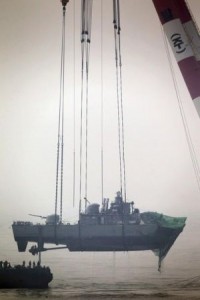The Cheonan Investigation: Interim Results and South Korean Policy Options
More on:

The Washington Post reports that interim results of a South Korea-led international investigation into the March 26th sinking of the 1,200-ton corvette Cheonan near Baek-ryong Island are due to be released by the South Korean government on Thursday morning (Wednesday evening EST). The report, which concludes on the basis of strong circumstantial forensic evidence that a North Korean torpedo sunk the Cheonan, will provide an initial basis upon which the South Korean government will pursue a range of policy responses. These responses can be categorized according to four different tracks: 1) domestic, 2) inter-Korean, 3) the U.S.-ROK alliance, 4) international.
First, South Korea has set up an independent commission tasked to evaluate South Korean defense policies. This commission will recommend actions South Korea can take to redress its vulnerabilities to North Korean unconventional and surprise attacks. The commission will also evaluate the direction of South Korean defense policy in light of the Cheonan incident in a review that will influence the relative priority of peninsular vs. off-peninsula missions, relative balance of South Korea’s force structure, and the procurements necessary to achieve those objectives. If the Cheonan case is handled well, the commission’s recommendations will lead to a stronger, more capable South Korean military.
Second, the Cheonan incident obviously has negative ramifications for the inter-Korean relationship, but there is little appetite in South Korea for a war with the North. Instead, the Lee administration is mobilizing economic pressure where possible in an attempt to squeeze North Korean finances, without providing the North with a pretext for further escalation. This approach has come in for some criticism in South Korea for pushing North Korea further into China’s strategic embrace.
Third, the Lee administration has attempted to work hand-in-glove with the United States both militarily and diplomatically. The United States could become more involved in joint patrols near the South Korean declared Northern Limit Line (NLL) in the West Sea, where the United States has traditionally minimized direct involvement since that line is not a part of the armistice agreement. A larger question is how alliance coordination can deter North Korean unconventional attacks, and the extent to which the psychology behind North Korea’s nuclear weapons possession may embolden Pyongyang to repeat such actions on the bet that they can do so with impunity.
Finally, the Lee administration made an early bet that internationalizing the Cheonan response would be the most effective South Korean course of action. Involving international investigators shields the South from accusations that the investigation is biased, but thus far it appears to have yielded little political influence with China, who has applauded South Korea’s decision to undertake a “scientific and objective investigation.” Furthermore, China’s decision to host Kim Jong Il less than a week following Lee Myung-bak’s visit was taken very poorly in Seoul, potentially revealing the limits of South Korea’s internationalization strategy. China is unlikely to accept condemnation of North Korea at the UN Security Council without a “smoking gun” that directly links North Korea to the Cheonan incident.
South Korea’s international approach casts China as the enabler of North Korean provocations. South Korea’s approach attempts to impose potential costs on China as a proxy for South Korean inability to impose costs directly on North Korea. In this approach, China’s failure to rein in North Korea will have costs to China’s interests on the Korean peninsula (as enumerated in my recent CSIS report with Bonnie Glaser on the need for Sino-U.S.-ROK dialogue to plan for instability in North Korea) in the form of increased South Korean public hostility toward China, increased regional tensions on China’s periphery, and by making China North Korea’s guardian at the UN. It remains to be seen whether South Korea’s post-Cheonan diplomacy will influence China’s approach to the peninsula.
More on:
 Online Store
Online Store
